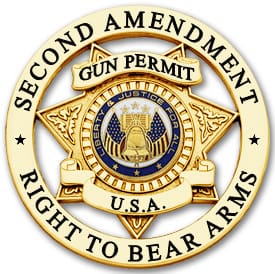The whitehouse.gov‘s Constitution section reports that “The Second Amendment gives citizens the right to bear arms.” Wait. What? The Constitution doesn’t give Americans rights. It protects citizens’ natural/civil rights—such as the right to keep and bear arms—from government infringement. (Interesting that they forgot the “keep” part.) TTAG reader Cyrus inspired my investigation, for he noticed something odd on another section of another site: senate.gov . . .
My wife had asked me what the sixth amendment was, and, to my shame, I knew not what right it protected. While reading the 6th Amendment to her [from whitehouse.gov], I realized that the website offered summaries on each section, for the convenience of the reader. I quickly scrolled up to the 2nd Amendment, to learn how I was to interpret the text.
Amendment II (1791) A well regulated Militia, being necessary to the security of a free State, the right of the people to keep and bear Arms, shall not be infringed.
Explanation:
“Whether this provision protects the individual’s right to own firearms or whether it deals only with the collective right of the people to arm and maintain a militia has long been debated.”
It is my understanding that the Heller Decision (2008) clarified that the 2nd Amendment guaranteed the right to bear arms as an individual right. Has the Senate not updated their website in the past 5 years? I wasn’t really surprised with this “explanation”, considering the textbook inaccuracies that have recently surfaced.
Just thought I would pass this on.





Once again, as with the deliberately false school textbooks, we see Holder’s agenda of “brainwashing the citizens to think differently about guns. As we did with cigarettes”. Or words to that effect. The quote may not be precisely accurate but you get the idea.
IIRC, if your recollection of the quote isn’t exact, I think it was because he had a serious emphasis on schools and ‘brainwashing’ school children. His comments: http://www.youtube.com/watch?v=0nM0asnCXD0 …so seeing all of this stuff showing up in textbooks is particularly interesting, maybe…
Yeah, the “Holder’s Agenda” textbooks are printed in Texas and the offending passage has been there at least since the Regan administration, and probably longer.
Take off your damned red glasses and realize that the slavers are rife on BOTH sides of the aisle.
Yes, and I don’t think it has “long been debated.” I think it was always taken for granted that the 2A protected an individual right, and only due to encroaching gun control legislation in the past few decades has that even been questioned and started to be skewed by the anti- side, which pushed the whole “collective right” idea for 2A.
For instance, the Dred Scott decision back in 1857 when they were trying to prevent African Americans from becoming citizens. One of the arguments to prevent that included a CLEAR assumption that 2A applied to every single citizen individually. In speaking of ‘repercussions’ for granting African Americans citizenship:
“It would give to persons of the negro race, …the right to enter every other State whenever they pleased, …to sojourn there as long as they pleased, to go where they pleased …the full liberty of speech in public and in private upon all subjects upon which its own citizens might speak; to hold public meetings upon political affairs, and to keep and carry arms wherever they went.
^This FTW
Yep. And all that scared the bejeezus out of Mr. Justice Taney.
I had completely forgotten about that one. Apparently so has most of the American people.
“I think it was always taken for granted that the 2A protected an individual right”
No, it wasn’t.
US v. Cruikshank (1875) ruled that the Second Amendment merely imposed restrictions on the federal government, leaving the individual states to do free as they saw fit.
The right there specified is that of ‘bearing arms for a lawful purpose.’ This is not a right granted by the Constitution. Neither is it in any manner dependent upon that instrument for its existence. The second amendment declares that it shall not be infringed; but this, as has been seen, means no more than that it shall not be infringed by Congress. This is one of the amendments that has no other effect than to restrict the powers of the national government, leaving the people to look for their protection against any violation by their fellow-citizens of the rights it recognizes, to what is called, in The City of New York v. Miln, 11 Pet. 139, the ‘powers which relate to merely municipal legislation, or what was, perhaps, more properly called internal police,’ ‘not surrendered or restrained’ by the Constitution of the United States.
Presser v Illinois (1886) ruled that the right to bear arms existed for the purposes of militia service (“maintaining the public security” and “performing their duty to the general government.”)
It is undoubtedly true that all citizens capable of bearing arms constitute the reserved military force or reserve militia of the United States as well as of the states, and, in view of this prerogative of the general government, as well as of its general powers, the states cannot, even laying the constitutional provision in question out of view, prohibit the people from keeping and bearing arms, so as to deprive the United States of their rightful resource for maintaining the public security, and disable the people from performing their duty to the general government.
US v Miller (1939) ruled that sawed-off shotguns could be restricted because it did not have “any reasonable relation to the preservation or efficiency of a well regulated militia, and therefore cannot say that the Second Amendment guarantees to the citizen the right to keep and bear such a weapon.”
In the absence of any evidence tending to show that possession or use of a “shotgun having a barrel of less than eighteen inches in length” at this time has some reasonable relationship to the preservation or efficiency of a well regulated militia, we cannot say that the Second Amendment guarantees the right to keep and bear such an instrument. Certainly it is not within judicial notice that this weapon is any part of the ordinary military equipment, or that its use could contribute to the common defense.
Heller changed this to an individual right. McDonald served to “incorporate” Heller for the first time. When the Constitution was first written, the Bill of Rights concerned only the federal government; over time, this has changed so that the individual states are also obliged to follow most of the Bill of Rights. (The Sixth Amendment remains an exception to this.)
Typo above: It’s the Seventh Amendment that hasn’t been incorporated. (“In Suits at common law, where the value in controversy shall exceed twenty dollars, the right of trial by jury shall be preserved, and no fact tried by a jury, shall be otherwise re-examined in any Court of the United States, than according to the rules of the common law.”)
William Rawle had a slightly different thought. He seemed to think the 2nd could apply to both state and federal government. He lived during that area and I think had a much better understanding than anyone else. Just because courts interpret a decision a certain way doesn’t mean that’s what the founders wanted.
The reality is that the Bill of Rights was originally written to restrict federal authority. That was the intent at the time, and that’s how it was interpreted for decades thereafter.
It wasn’t until later, as a result of the 14th Amendment and cases that followed, that the reach of the Bill of Rights was expanded so that the states were included.
And as I noted, the Seventh Amendment has never been incorporated to include the states, not even now.
SCOTUS disagreed with your interpretation of Presser re individual rights.
(f)
None of the Court’s precedents forecloses the Court’s interpretation. Neither United States v. Cruikshank, 92 U. S. 542, 553, nor Presser v. Illinois, 116 U. S. 252, 264–265, refutes the individual-rights interpretation. United States v. Miller, 307 U. S. 174, does not limit the right to keep and bear arms to militia purposes, but rather limits the type of weapon to which the right applies to those used by the militia, i.e., those in common use for lawful purposes. Pp. 47–54.
I didn’t provide you with any interpretation. I quoted the earlier rulngs verbatim.
Scalia, the judicial activist-in-denial who he is, decided to reinterpret earlier rulings in ways that they had never previously been interpreted. There are some obvious contradictions between Heller and those earlier decisions, yet Scalia wants to pretend that Heller didn’t effectively overturn them.
The sixth is the right to a quick and speedy trial. That’s off the top of my head.
The right to trial by jury, being told what you’re accused of, confronting the witnesses against you, calling your own witnesses, and receiving legal counsel that I didn’t remember off the top of my head are obviously unimportant.
Well here in California that jury by peers now includes illegal aliens..
Oh and an illegal alien can be your lawyer too! Yippee….
Was the CA State Legislature secretly swapped with the inmates of a mental institution while we weren’t looking? Or a kindergarten class, minus the teacher? I deeply pity the residents.
Yes I think you are spot on the Heller Decisions. I think the key worlds ” the right of the people to keep and bear Arms, shall not be infringed” are key in that you can’t have a militia unless you have citizens that are armed. Just because we have the Army and National Guard doesn’t mean that it may be necessary to in the future to form a citizens militia albeit unlikely unless you consider south Chicago and the Southern border of the U.S as situations that need a citizens militia . LOL Seriously if you read the decision of the majority it is clear that we indeed have the inherent right to have guns. but remember the vote was 5-4 in the Heller decision. So make sure you register and vote. We lost the 2012 election in part to not enough makers/gun owners voting.
I might be wrong, but I thought it was 9-0 that the Second Amendment was an individual, rather than collective right; and that the split was 5-4 over whether it was an absolute right.
So, we’re going to spend the next 40 years arguing over the exact meaning of “infringed.” And how many angels can dance on the head of a pin.
The dissent did not agree that it was an individual right, although the introductory paragraph of the dissent could lead one to believe that.
Whether we have Army/Navy/Air force OR the Army/Navy National guard, the “people” are still considered the “miltia”. 10 USC 311:
(a)The militia of the United States consists of all able-bodied males at least 17 years of age and, except as provided in section 313 of title 32, under 45 years of age who are, or who have made a declaration of intention to become, citizens of the United States and of female citizens of the United States who are members of the National Guard.
(b)The classes of the militia are—
(1)the organized militia, which consists of the National Guard and the Naval Militia; and
(2)the unorganized militia, which consists of the members of the militia who are not members of the National Guard or the Naval Militia.
To be fair, it DOES seem like it has been a bone of contention in the White House, but I think its safe to say in the Senate, House, and Courts, that debate has been long settled.
Time to write your Senator and have them pass the message to Dingy Hair Reid, Shotgun Joe and Barry.
~ 2000 Barry gave a talk on NPR complaining that the Bill of Rights told government what it can’t do to you instead of what it can do for you. So the fukker knows.
Hey, it could be worse. Whether it’s an inherent, pre-existing human right or one granted by the Constitution, at least they’re acknowledging that a protected right to bear arms does exist.
“Has the White House not updated their website in the past 5 years? I wasn’t really surprised with this “explanation”, considering the textbook inaccuracies that have recently surfaced.”
Robert, the explanations are on the senate.gov site not whitehouse.gov. Blame the senate for the explanation.
I’m more surprised the White House can spell Constitution.
I am more surprised they have access to one
The Constitution was moved from the National Archives to the White House bathroom so the President can wipe his butt with it. I’m pretty sure a similar program has been in place for about a dozen or so Presidents now.
Check out what the senate thinks of the third amendment:
“This virtually obsolete provision was in response to anger over the British military practice of quartering soldiers in colonists’ homes.”
I wonder what other parts of the constitution they consider obsolete.
Yeah… The fact that the government hasn’t often violated it doesn’t mean it isn’t necessary. In fact, that might be evidence that it’s working. Or that there isn’t much to gain from violating it. Let’s go with it’s working.
There is currently a Third Amendment case making it’s way through the courts right now. The interesting thing is that it states what many already believe about the internal police forces in this country.
http://blogs.wsj.com/law/2013/07/05/forgotten-third-amendment-surfaces-in-nevada-case/
Whatever amendment is currently standing in their way.
Well, at least the archives.gov site says this in the FAQ:
Q. Does not the Constitution give us our rights and liberties?
A. No, it does not, it only guarantees them. The people had all their rights and liberties before they made the Constitution. The Constitution was formed, among other purposes, to make the people’s liberties secure– secure not only as against foreign attack but against oppression by their own government.
I’d like to share something from a great man,”you won’t get gun control by disarming law abiding citizens. There’s only one way to get real gun control : Disarm the thugs and the criminals,lock them up and if you don’t actually throw away the key,at least lose it for a long time… It’s a nasty truth but those who seek to inflict harm are not fazed by gun controllers.I happen to know this from personal experience.” Ronald Reagan Be prepared and ready.Keep our powder dry.
The 2nd amendment does not just protect the natural right of citizens to keep and bear arms, it protects the right of PEOPLE to bear arms. All people. No mention of citizens. This is just one more way that normally liberty loving Americans are allowing further erosion of the Constitution, by insisting that it only applies to citizens or accepting that misinterpretation. I see this all too often by tea party types.
The right of THE people, not the right of people. We already give illegals free food, housing, schooling, and healthcare. Now we are expected to let them walk around with guns when they are already breaking the law by being here illegally? Next they will demand they be allowed to purchase guns with their EBT cards.
Are you sure you weren’t inspired by my comment pointing this out on your Texas textbook post last week RF? ;^)
Everytime he opens his mouth, I become more afraid for my family, my friends and my country!
The part of SCOTUS ruling on meaning of second amendment in Heller:
Held:
1. The Second Amendment protects an individual right to possess a firearm unconnected with service in a militia, and to use that arm for traditionally lawful purposes, such as self-defense within the home.Pp. 2–53.
(a) The Amendment’s prefatory clause announces a purpose, but does not limit or expand the scope of the second part, the operative clause. The operative clause’s text and history demonstrate that it connotes an individual right to keep and bear arms. Pp. 2–22.
(b) The prefatory clause comports with the Court’s interpretation of the operative clause. The “militia” comprised all males physically capable of acting in concert for the common defense. The Anti-federalists feared that the Federal Government would disarm the people in order to disable this citizens’ militia, enabling a politicized standing army or a select militia to rule. The response was to deny Congress power to abridge the ancient right of individuals to keep and bear arms, so that the ideal of a citizens’ militia would be preserved. Pp. 22–28.
(c)
The Court’s interpretation is confirmed by analogous arms-bearing rights in state constitutions that preceded and immediately followed the Second Amendment. Pp. 28–30.
(d)
The Second Amendment’s drafting history, while of dubious interpretive worth, reveals three state Second Amendment proposals that unequivocally referred to an individual right to bear arms. Pp. 30–32.
(e)
Interpretation of the Second Amendment by scholars, courts and legislators, from immediately after its ratification through the late 19th century also supports the Court’s conclusion. Pp. 32–47.
(f)
None of the Court’s precedents forecloses the Court’s interpretation. Neither United States v. Cruikshank, 92 U. S. 542, 553, nor Presser v. Illinois, 116 U. S. 252, 264–265, refutes the individual-rights interpretation. United States v. Miller, 307 U. S. 174, does not limit the right to keep and bear arms to militia purposes, but rather limits the type of weapon to which the right applies to those used by the militia, i.e., those in common use for lawful purposes. Pp. 47–54.
Comments are closed.